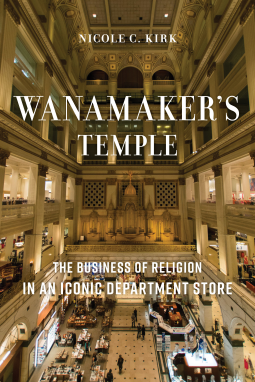 |
Wanamaker's Temple
by Nicole C. Kirk ISBN-13: 9781479835935 Hardback: 288 pages Publisher: NYU Press Released: Oct. 23, 2018 |
Source: ebook review copy from the publisher through NetGalley.
Book Description, Modified from Goodreads:
How a pioneering merchant blended religion and business to create a unique American shopping experience. Remembered for his store’s extravagant holiday decorations and displays, Wanamaker built one of the largest retailing businesses in the world and helped to define the American retail shopping experience. From the freedom to browse without purchase and the institution of one price for all customers to generous return policies, he helped to implement retailing conventions that continue to define American retail to this day.
Wanamaker was also a leading Christian leader, participating in the major Protestant moral reform movements from his youth until his death in 1922. But most notably, he found ways to bring his religious commitments into the life of his store. He focused on the religious and moral development of his employees, developing training programs and summer camps to build their character, while among his clientele he sought to cultivate a Christian morality through decorum and taste.
Wanamaker’s Temple examines how and why Wanamaker blended business and religion in his Philadelphia store, offering a historical exploration of the relationships between religion, commerce, and urban life in the late nineteenth and early twentieth century and illuminating how they merged in unexpected and public ways.
My Review:
Wanamaker's Temple talked about John Wanamaker's business career, some things that influenced him and he cared about, and the new business practices that he instituted. The author also looked at how Wanamaker changed his business practices to reflect his religious beliefs. In addition to teaching Sunday school and donating money to Protestant causes, he wanted to influence people through his stores. He believed he could lift people up through beautiful architecture, music and religious art on display at his stores, decorating his stores for religious holidays, and educating his young, poor employees who had to work rather than go to school. This education included the basics as well as manners, fitness, and a work ethic. Overall, I'd recommend this interesting look at the time period, though I got the feeling that the author mildly disapproved of Wanamaker.
If you've read this book, what do you think about it? I'd be honored if you wrote your own opinion of the book in the comments.




No comments:
Post a Comment